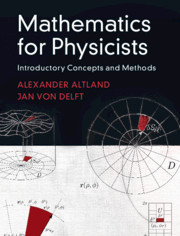Description
Mathematics for Physicists
Introductory Concepts and Methods
Authors: Altland Alexander, von Delft Jan
Introduces fundamental concepts and computational methods of mathematics from the perspective of physicists.
Language: English
Subject for Mathematics for Physicists:
Approximative price 54.78 €
In Print (Delivery period: 14 days).
Add to cart
Publication date: 02-2019
720 p. · 19.3x25.3 cm · Hardback
720 p. · 19.3x25.3 cm · Hardback
Description
/li>Contents
/li>Biography
/li>
This textbook is a comprehensive introduction to the key disciplines of mathematics - linear algebra, calculus, and geometry - needed in the undergraduate physics curriculum. Its leitmotiv is that success in learning these subjects depends on a good balance between theory and practice. Reflecting this belief, mathematical foundations are explained in pedagogical depth, and computational methods are introduced from a physicist's perspective and in a timely manner. This original approach presents concepts and methods as inseparable entities, facilitating in-depth understanding and making even advanced mathematics tangible. The book guides the reader from high-school level to advanced subjects such as tensor algebra, complex functions, and differential geometry. It contains numerous worked examples, info sections providing context, biographical boxes, several detailed case studies, over 300 problems, and fully worked solutions for all odd-numbered problems. An online solutions manual for all even-numbered problems will be made available to instructors.
Preface; Part I. Linear Algebra: 1. Mathematics before numbers; 2. Vector spaces; 3. Euclidean geometry; 4. Vector product; 5. Linear maps; 6. Determinants; 7. Matrix diagonalization; 8. Unitarity and hermiticity; 9. Linear algebra in function spaces; 10. Multilinear algebra; Problems: linear algebra; Part II. Calculus: 1. Differentiation of one-dimensional functions; 2. Integration of one-dimensional functions; 3. Partial differentiation; 4. Multi-dimensional integration; 5. Taylor series; 6. Fourier calculus; 7. Differential equations; 8. Functional calculus; 9. Calculus of complex functions; Problems: calculus; Part III. Vector Calculus: 1. Curves; 2. Curvilinear coordinates; 3. Fields; 4. Introductory concepts of differential geometry; 5. Alternating differential forms; 6. Riemannian differential geometry; 7. Case study: differential forms and electrodynamics; Problems: vector calculus; Solutions: linear algebra; Solutions: calculus; Solutions: vector calculus; Index.
Alexander Altland is Professor of Theoretical Physics at the Universität zu Köln. His areas of specialization include quantum field theory and the physics of disordered and chaotic systems. He is co-author of the hugely successful textbook Condensed Matter Field Theory (2nd edition, Cambridge, 2010). He received the Albertus Magnus Teaching Award of the faculty of mathematics and natural sciences of Universität zu Köln.
Jan von Delft is Professor of Theoretical Physics at the Arnold Sommerfeld Center for Theoretical Physics at the Ludwig-Maximilians-Universität Munchen. His research is focused on mesoscopic physics and strongly interacting electron systems. For his engagement in teaching, utilizing electronic chalk and 'example+practice' problem sheets including example problems with detailed solutions, he received a Golden Sommerfeld teaching award.
Jan von Delft is Professor of Theoretical Physics at the Arnold Sommerfeld Center for Theoretical Physics at the Ludwig-Maximilians-Universität Munchen. His research is focused on mesoscopic physics and strongly interacting electron systems. For his engagement in teaching, utilizing electronic chalk and 'example+practice' problem sheets including example problems with detailed solutions, he received a Golden Sommerfeld teaching award.
© 2024 LAVOISIER S.A.S.

